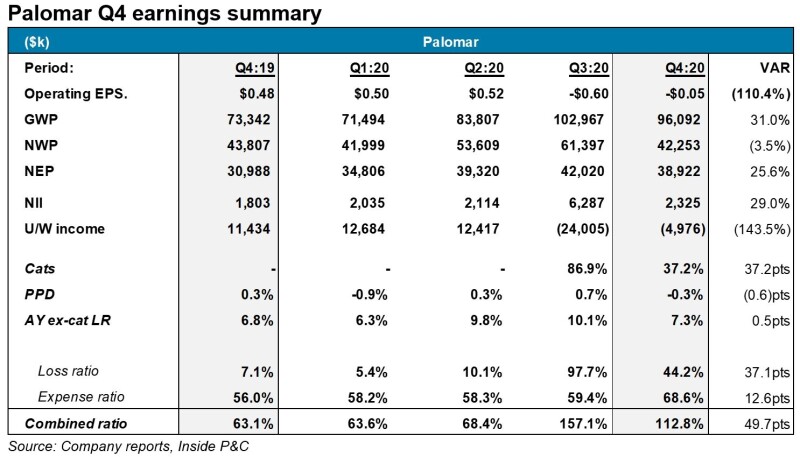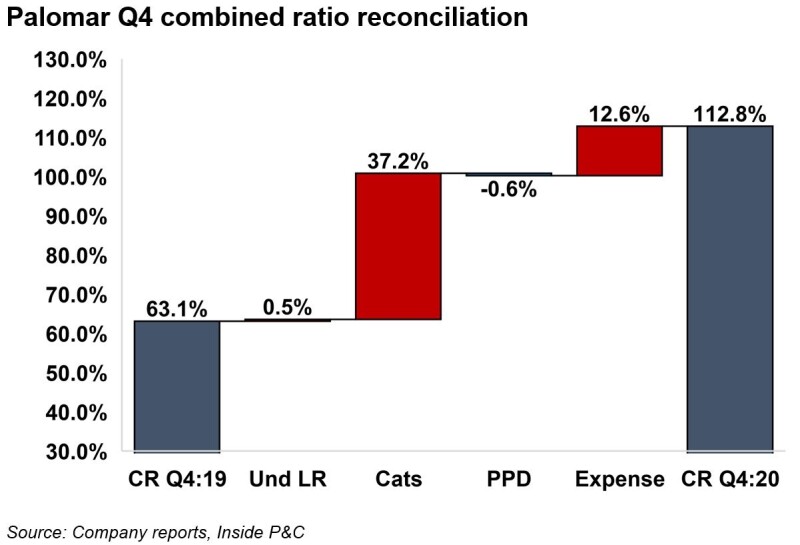California-based underwriter Palomar Holdings dropped to a $5mn underwriting loss in the fourth quarter, after the company recorded $14.5mn of catastrophe losses and a reinsurance expense acceleration charge that pushed the combined ratio up to 112.8%.
The company said that without the catastrophe losses, along with higher stock-based compensation expenses, its combined ratio would have totaled 70.3%.
Palomar’s operating loss in the quarter of $1.3mn, or about $0.05 a share, was down from Q4:19’s $11.5mn operating gain. The company earned about $11.5mn in underwriting income in the fourth quarter of 2019.
Despite the loss, the underwriter grew top-line gross written premiums (GWP) by 31% to $96mn, saying that it “modified” its approach to writing wind-exposed business, “upon review of potential risk-adjusted returns, catastrophe payback and prevailing market conditions.”
In a statement, Palomar chief executive and chairman Mac Armstrong said: “The combination of these efforts will not only reduce volatility but also further enhance visibility into our financial results. Finally, we continued investing in our technology and our team as we position Palomar for near and long-term success.”
The company said early this month it could be hit with up to $16.5mn in catastrophe losses, and that it had purchased additional aggregate reinsurance coverage.
The CEO also said in a statement that the launch of its non-admitted company, Palomar Excess and Surplus Insurance company, enabled it to grow its commercial lines premiums by 95% on the year.
Palomar’s GWP grew by 41% overall in 2020 to $354mn.
In its earnings release, Palomar noted it expected to deliver between $62mn and $67mn in adjusted net income in 2021, which factors in expected losses from winter storm Uri. Adjusted net income was down to $9mn in 2020 from $38mn in 2019.

Growth: Palomar grew its commercial all risk business the most in Q4, by almost $6mn in GWP, or by almost 70%, to $14mn. Premiums for inland marine were up more than fourfold in the quarter to $6mn. Residential earthquake business, Palomar’s most popular product, grew by 6%, or about $2mn, to $37mn. Specialty homeowners premiums were 46% higher at $11mn. California and Texas were the company’s two biggest states, with $49mn and $13mn in premiums written in the quarter, respectively.
Underwriting: Reserves developed favorably in the quarter by $0.1mn, versus adverse development of the same amount in the year-ago quarter. Excluding catastrophes, the underlying loss ratio rose modestly by 0.5 points to 7.3%.

Investments: Palomar said a higher level of invested assets, resulting from both increased cash from operations and proceeds from its January and June stock offerings, contributed to the almost 30% rise in investment income.
Commentary: Discussing the fourth quarter and full-year results, Armstrong said: “I am inspired by the efforts of our team to grow and evolve our business during the past year. We launched new products and a new insurance carrier, entered into new geographies, made key additions to our team, and continued our pursuit of the company’s strategic vision all while navigating circumstances that few of us could have anticipated. Our newly launched E&S carrier, Palomar Excess and Surplus Insurance Company, or PESIC, represents an exciting progression in our evolution.”
He continued: “We are committed to applying data and lessons learned to the continuous improvement of our business. During this past year we modified our approach to and participation in specific wind-exposed markets upon review of potential risk-adjusted returns, catastrophe payback and prevailing market conditions.
“We also made additional refinements to our risk transfer strategy. The combination of these efforts will not only reduce volatility but also further enhance visibility into our financial results. Finally, we continued investing in our technology and our team as we position Palomar for near and long-term success.”
He added: “Separately, I would like to address the severe weather activity throughout the country this past week, specifically Winter Storm Uri in Texas where Palomar has a considerable market presence. I want to tell our policyholders in Texas that our thoughts are with them, we stand ready to support them and we are here to help them rebound.”

